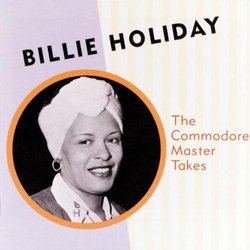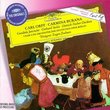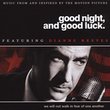| All Artists: Billie Holiday Title: Commodore Master Takes Members Wishing: 3 Total Copies: 0 Label: Polygram Records Original Release Date: 2/8/2000 Release Date: 2/8/2000 Genres: Jazz, Pop, Broadway & Vocalists Styles: Swing Jazz, Traditional Jazz & Ragtime, Vocal Jazz, Oldies, Vocal Pop, Cabaret, Traditional Vocal Pop Number of Discs: 1 SwapaCD Credits: 1 UPCs: 731454327220, 0731454327220, 073145432722 |
Search - Billie Holiday :: Commodore Master Takes
 | Billie Holiday Commodore Master Takes Genres: Jazz, Pop, Broadway & Vocalists These historic recordings--made mostly in 1939--represent a crucial period for Billie Holiday, who had already achieved some success as a jazz singer recording for Columbia but had yet to really reach her peak as a perform... more » |
Larger Image |
CD DetailsSynopsis
Amazon.com These historic recordings--made mostly in 1939--represent a crucial period for Billie Holiday, who had already achieved some success as a jazz singer recording for Columbia but had yet to really reach her peak as a performer or icon. The Commodore Master Takes, recorded for Milt Gabler's small independent label, were a step towards Holiday's eventual infamy, thanks notably to the recording of "Strange Fruit," a controversial song about lynching that Columbia Records simply refused. Recording with several small bands that seemed to understand the nuances of her voice perfectly, Holiday is in full command of her faculties here, without a trace of her later deterioration. Instead, we have a singer bearing all the bittersweet conviction of the best blues stylists. Songs like "How Am I to Know?" and "My Old Flame" simply smolder, and the band's support is understated, not overpowering. Holiday is the show here. In its own way, that sets a precedent, considering this was still the big-band era, and a jazz singer with such sparse backing was still an anomaly. Excellent liner notes by Orrin Keepnews--who explains how his own relationship with Billie Holiday was sometimes rocky--complete the picture. --Joe S. Harrington Similarly Requested CDs
|
CD ReviewsFine and mellow jota | College Park, MD United States | 11/25/2001 (5 out of 5 stars) "The "official" amazon.com review above says that these recordings wrre made "mostly" in 1939, which is misleading; four of the tunes, among them "Strange Fruit," were recorded then, but the other twelve are from 1944. The reviewer also says that the recordings contain no traces of her later "deterioration," but I hear considerably more raggedness here than on the earlier Columbia recordings. This isn't a criticism; these sides, I think, strike just the proper blanace between the chipper just-one-of-the guys vibe of the Columbias and the sometimes oppressively tragic atmosphere of the later Verve albums.These are small-group recordings, but the accompaniments are more low-key than on the Columbias and the instrumentalists get much less solo space. So there is nothing here akin to Holiday's relationship with Lester Young on those earlier recordings. On the other hand, the material on the Commodores is superior; she recorded only the finest standards and blues, as opposed to the hokum she was regularly forced to deal with for Columbia. As for highlights, "Strange Fruit" is a remarkable historical document, more effective as moving propaganda than as a popular song. "I Cover the Waterfront" is one of the best versions of a classic tune, and her version of "How Am I To Know?" is especially striking, as she begins her vocal with a dramatically isolated "Oh!" before beginning her mournful reading of the lyric." At her peak Nikica Gilic | 06/25/2007 (5 out of 5 stars) "This is the great (and quite possibly the greatest) Billie Holiday at her peak, singing "Fine and Mellow", "I'll Get By", "Billie's Blues", "I Gotta Right to Sing the Blues"... I'm not such a big fan of "Strange Fruit", although I recognize and commend its political and ethical significance. It is only a pitty the fine musicians, such as Frankie Newton on trumpet or Vic Dickenson on trombone were not put to a better use... Billie's earlier recordings with the Prez, Teddy Wilson, Roy Eldridge and other jazz giants prove how even she can grow in good company; her late recordings, where she had very little voice left also speak for this; on Sound of jazz she delivered Fine and Mellow as fine and mellow as anything she had ever recorded, and with Ben Webster and Harry Edison, her late (and potentially sad) recordings still provide some fine music... Still, this IS Billie at her peak; her rhythm, melody and timbre impeccable, gently swinging like no other singer..." Valuable record of a great American singer. David Bonesteel | Fresno, CA United States | 08/22/2005 (5 out of 5 stars) "Billie Holiday's beguiling voice reaches out to us across a span of greater than 60 years and still succeeds at enchanting the discerning listener. This is an excellent collection of blues and jazz standards, interpreted by a master. Of particular note is the startling and graphic "Strange Fruit," a mournful lament about lynching that is one of the most chilling pieces I have ever heard; one listen and you'll understand why it was suppressed in its time and also how courageous Billie must have been to record it in the first place. (The first time I heard it, I had just put out the lights and was lying in bed in the dark; talk about getting the shivers!) Other standout tracks include "I Cover the Waterfront" and "I'll Be Seeing You," but there really isn't any fat on this disk at all."
|










